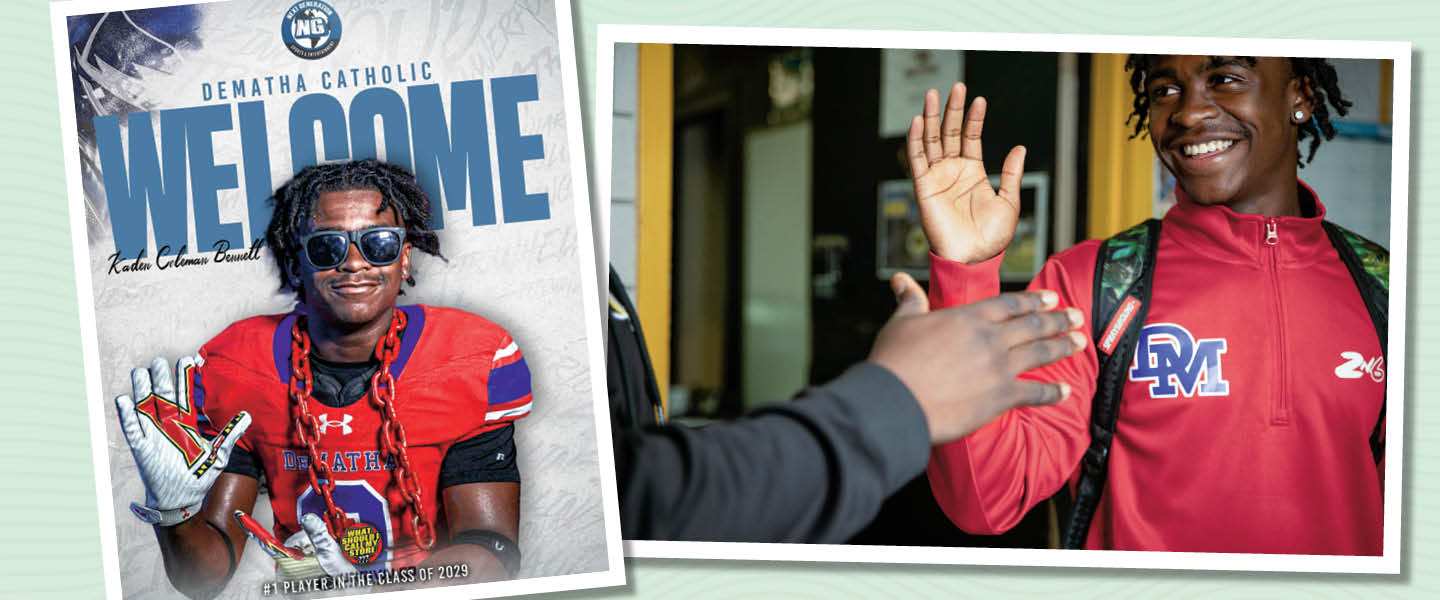Kaden Coleman-Bennett was 10 when youth football coaches started pressing envelopes with thousands of dollars into his mom’s hand, asking for Kaden to play for their club teams. Brittany Coleman always refused. Payments for top players, an open secret in youth sports, weren’t allowed, and she didn’t want to tarnish her son. But there was another, potentially far more lucrative, way for Kaden, who became one of the best eighth-grade football players in the nation, to profit from his talent.
Coleman allowed her son to sign sponsorship deals with a local fashion brand and an athletic gear company. Now a 14-year-old freshman at the national football powerhouse DeMatha Catholic High School in Hyattsville, Maryland, Kaden also has an agent to help him with future deals.
“The goal is for him to reach a million dollars his freshman year,” his mom says.
Just as college athletes can now accept payment for their athletic talent through name, image, and likeness, or N.I.L., deals—which compensate players for the use of their image in commercials and other promotional material—so can high school students. Since 2021, when the National Collegiate Athletic Association (N.C.A.A.) began allowing N.I.L. deals for college athletes, high school athletic associations in at least 40 states and the District of Columbia have implemented their own N.I.L. policies. Major brands such as Reebok, Gatorade, and Leaf Trading Cards have offered deals to a handful of high school football and basketball stars, and local businesses including real estate companies and restaurants participate as well. The deals can range from modest—free clothing and food—to multimillion-dollar signing bonuses.
The idea of student athletes profiting from high school sports has raised concerns. State association rules tend to leave it to the students and their families to negotiate contracts—schools aren’t involved—and missteps could lead to predatory deals or even a student’s losing eligibility to participate in school sports.
“In compensating minors, you just hope that they have someone responsible acting on their behalf,” says David Ridpath, a professor of sports business at Ohio University.
But the potential for some of the bigger deals to bring financial security to families and lucrative recruitment offers from colleges is too good to pass up, say proponents. Keith Hardy, the founder of clothing company Second N Six, sees his deal with Kaden as a win for both of their futures.
“It is a bet on Kaden’s future,” Hardy says, “that he is going to blow up even more in high school and wherever he goes to college.”
Kaden Coleman-Bennett was 10 when youth football coaches started pressing envelopes with thousands of dollars into his mom’s hand. They wanted Kaden to play for their club teams. Brittany Coleman always refused. She knew that payments for top players, an open secret in youth sports, weren’t allowed. She didn’t want to harm her son’s reputation. But there was another way for Kaden, who became one of the best eighth-grade football players in the nation, to profit from his talent.
Coleman allowed her son to sign sponsorship deals with a local fashion brand and an athletic gear company. Kaden is now a 14-year-old freshman at the national football powerhouse DeMatha Catholic High School in Hyattsville, Maryland. He also has an agent to help him with future deals.
“The goal is for him to reach a million dollars his freshman year,” his mom says.
College and high school athletes can now accept payment for their athletic talent through name, image, and likeness, or N.I.L., deals. These deals compensate players for the use of their image in commercials and other promotional material. Since 2021, when the National Collegiate Athletic Association (N.C.A.A.) began allowing N.I.L. deals for college athletes, high school athletic associations in at least 40 states and the District of Columbia have implemented their own N.I.L. policies. Major brands such as Reebok, Gatorade, and Leaf Trading Cards have offered deals to a handful of high school football and basketball stars. Local businesses including real estate companies and restaurants participate as well. The deals can range from free clothing and food to multimillion-dollar signing bonuses.
The idea of student athletes profiting from high school sports has raised concerns. State association rules tend to leave it to the students and their families to negotiate contracts. The schools aren’t involved in making deals. However, mistakes could lead to predatory deals or even a student’s losing eligibility to participate in school sports.
“In compensating minors, you just hope that they have someone responsible acting on their behalf,” says David Ridpath, a professor of sports business at Ohio University.
But the potential for some of the bigger deals to bring financial security to families and profitable recruitment offers from colleges is too good to pass up, say proponents. Keith Hardy, the founder of clothing company Second N Six, sees his deal with Kaden as a win for both of their futures.
“It is a bet on Kaden’s future,” Hardy says, “that he is going to blow up even more in high school and wherever he goes to college.”

